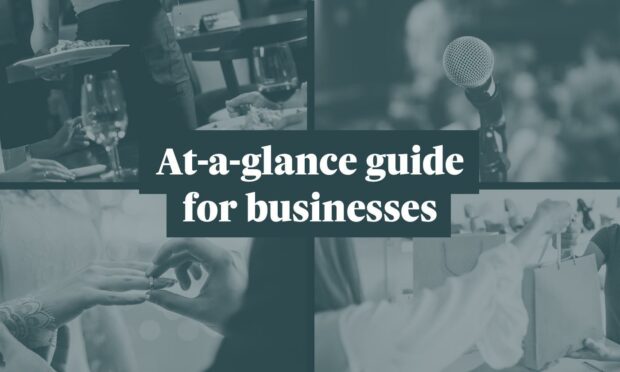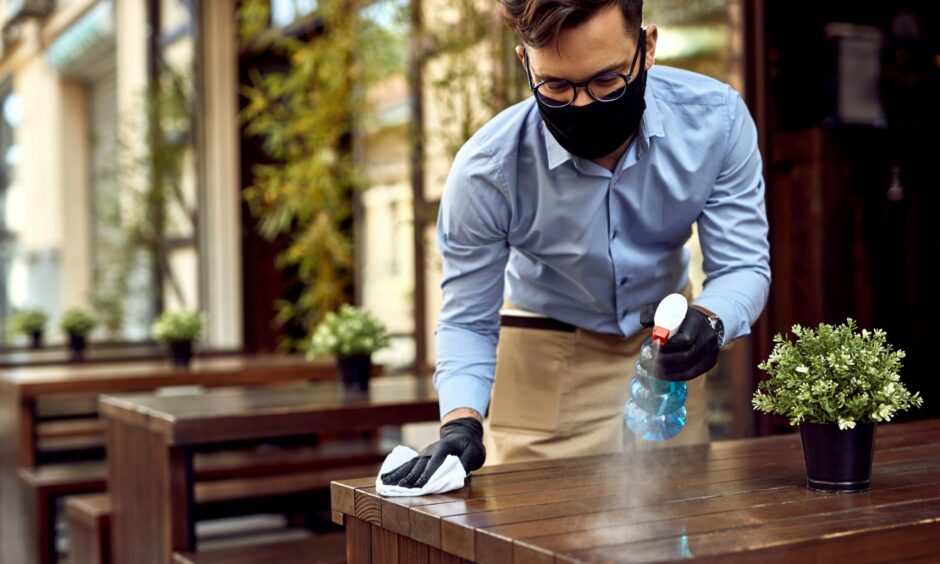Protective screens are poised to return in shops, bars and cafes as part of new special guidance to control the spread of the Omicron.
First Minister Nicola Sturgeon earlier warned “we do not have time to waste” as she urged people to follow the guidance and minimise mixing with others.
Now the Scottish Government has published guidance for businesses to keep staff and customers safe, which come into effect from Friday, December 17.
It follows firms already being asked to move back to home working where possible to limit social interactions.
First minister ‘profoundly concerned’ about Omicron
New guidance has been introduced for businesses, with Ms Sturgeon saying she is “profoundly concerned” about the number and spread of Omicron cases.
She warned action must also be taken to fight the Covid variant alongside the accelerated vaccine booster rollout.
New guidance has been published that takes effect from 00.01, Friday 17 December.
Amongst other measures, businesses should:
🔹Enforce mask wearing
🔹Distance customers where possible
🔹Let staff work from home where they canRead more➡️https://t.co/s28Hcfycup pic.twitter.com/fzvjupV8xV
— Scottish Government Finance and Economy (@scotgoveconomy) December 16, 2021
The Scottish Government has published new Covid regulations, which come into force on December 17, state businesses and places of worship must pay attention to new Omicron guidance and enforce as many that are “reasonably practicable”.
General guidance for all businesses
- Changing the layout of premises, including location of furniture and workstations.
- Controlling use of entrances, passageways, stairs and lifts.
- Controlling use of shared facilities, including toilets and kitchens.
- Installing barriers or screens.
- Providing or requiring the use of personal protective equipment.
- Providing information on minimising risk to those working in or visiting workplace.
Guidance for hospitality
- Mandatory collection of contact details remains in place.
- Strongly encourage table service.
- Takeaway options may be provided.
- Bar service remains permitted in law.
Guidance for retail
- Control flows of customers entering and exiting to minimise transmission risk.
- Promote and provide hand hygiene stations.
- Use tannoy systems, signs, floor markings and queue management systems to help people keep a safe distance from others.
- Promoting the use of face coverings.
- Using screens to create a physical barrier between people, for example at till points and self-service checkouts.
- Maximising fresh air coming into the premises.
Working in other people’s homes
- Before entering other people’s home, workers should undertake a lateral flow test on the day, prior to attendance.
- Householders should also undertake a lateral flow test on the day, prior to the visit.
- If anyone in the house is self-isolating, staff should not enter unless the work required is essential or an emergency.
- Staff should wear a face covering, especially when moving through the home or engaging with any of the householders.
- Workers should try to keep a reasonable distance from individuals in the household.
Additional measures that could be taken
- Encourage the use of outdoor spaces for meetings and breaks.
- Staggering break times to reduce pressure on break or eating areas.
- Reviewing use of locker rooms, changing areas and other facility areas to reduce concurrent usage.
- Limit household mixing to three households at any one time before and after Christmas Day.
- Businesses should support staff to stay at home if they are unwell even if they don’t have Covid-19 symptoms.
- Queuing inside premises should be avoided where possible. Where this is not possible, measures should be implemented to help people keep their distance from each other.
Meanwhile, face coverings remain mandatory in most indoor public and communal spaces including shops, restaurants, cafes, bars and public transport – unless exempt for specific circumstances.
Anyone who develops Covid symptoms, including a continuous cough, fever or loss or change in sense of smell or taste, should isolate and arrange a test.

